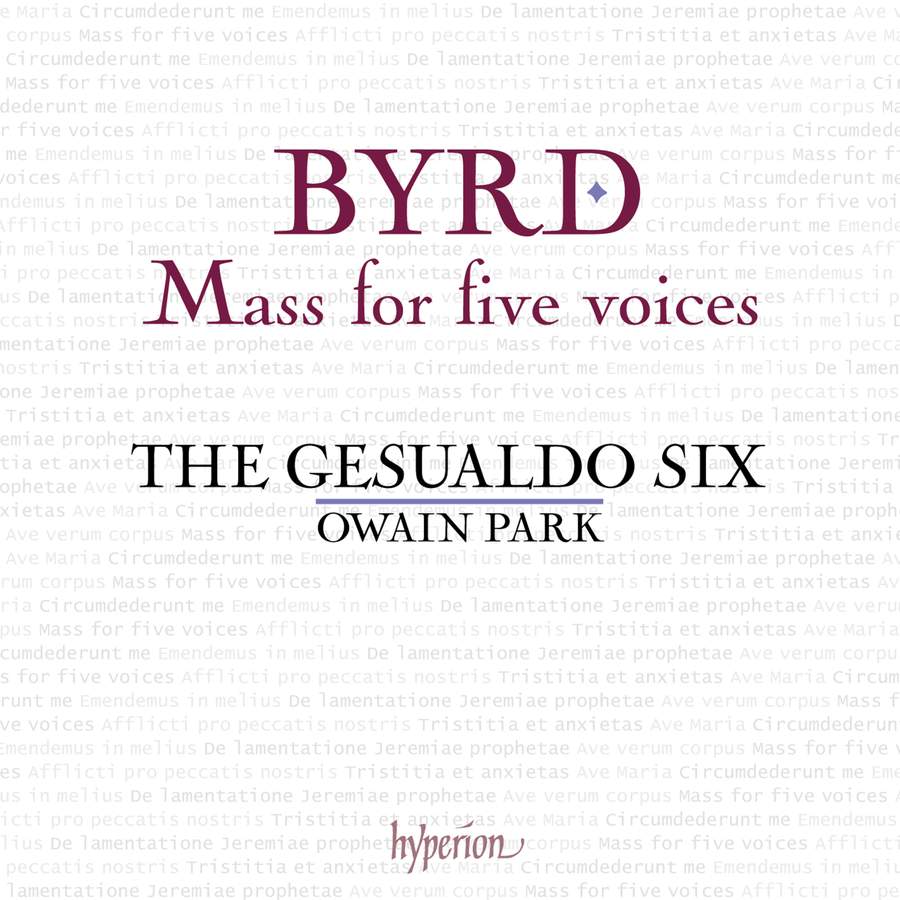BYRD Mass for Five Voices
View record and artist detailsRecord and Artist Details
Composer or Director: Owain Park
Genre:
Vocal
Label: Hyperion
Magazine Review Date: 09/2023
Media Format: CD or Download
Media Runtime: 66
Mastering:
DDD
Catalogue Number: CDA68416

Tracks:
| Composition | Artist Credit |
|---|---|
| Liber secundus sacrarum cantionum, Movement: Afflicti pro peccatis nostris |
William Byrd, Composer
Owain Park, Composer The Gesualdo Six |
| Ave Maria |
William Byrd, Composer
Owain Park, Composer The Gesualdo Six |
| Ave verum corpus |
William Byrd, Composer
Owain Park, Composer The Gesualdo Six |
| Circumdederunt me |
William Byrd, Composer
Owain Park, Composer The Gesualdo Six |
| De lamentatione Jeremiae prophetae |
William Byrd, Composer
Owain Park, Composer The Gesualdo Six |
| Emendemus in melius |
William Byrd, Composer
Owain Park, Composer The Gesualdo Six |
| Mass for five voices |
William Byrd, Composer
Owain Park, Composer The Gesualdo Six |
| Tristitia et anxietas |
William Byrd, Composer
Owain Park, Composer The Gesualdo Six |
Author: Fabrice Fitch
Other ensembles have marked the Byrd anniversary with celebratory, large-scale offerings; The Gesualdo Six opt for the five-voice Mass, framed by penitential motets. The last and most richly scored of Byrd’s Masses offers perhaps the greatest scope for interpretation, with shifts and contrasts of texture to the fore, encompassing both two-voice writing and opulent chordal statements. It is a special strength of this recording that The Gesualdo Six sound pellucid and grand and yet intimate, as though combining two approaches. That’s down to a sound recording that feels very closely miked (so much so that one senses a risk of distortion should they sing any louder) and of course – almost needless to say by now – to the wonderful blend of sound the singers achieve. These qualities come through especially strongly in Circumdederunt me, whose special ending (or, rather, the minute or so preceding it) is a highlight; so is the expressive opening out that the singers bring to the phrase ‘dolores mortis’.
Frankly, one wishes that they did this kind of thing more often. Often, the musical surface is polished and careful to a fault (the countertenor’s top notes a case in point) and the music’s affective potential is underplayed. Think back to the Hilliard Ensemble in their prime delivering the Credo’s ‘et ascendit in caelum’, where the voices climb to the top of their range, Paul Hillier’s baritone seemingly caught up in wonder at what Byrd depicts; here there is little sense of wonder, and the countertenor slightly fluffs his line – a slip so uncharacteristic that it stands out. Just after the start of the second half of Emendemus in melius, Byrd indulges in something dangerously close to chromaticism (at ‘Propter honorem nominis tuis’); beautifully delivered, but with no hint that something quite unusual is happening in that moment. The swan processes seemingly imperturbably, but one wants to sense the work of the legs propelling it forwards. The dialling down of expression works better for the young Byrd of the Lamentations, it seems to me; but with the mature master, and from an ensemble so accomplished, one hopes for more.
Discover the world's largest classical music catalogue with Presto Music.

Gramophone Digital Club
- Digital Edition
- Digital Archive
- Reviews Database
- Full website access
From £8.75 / month
Subscribe
Gramophone Full Club
- Print Edition
- Digital Edition
- Digital Archive
- Reviews Database
- Full website access
From £11.00 / month
Subscribe
If you are a library, university or other organisation that would be interested in an institutional subscription to Gramophone please click here for further information.




